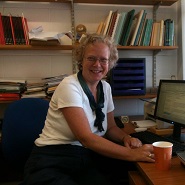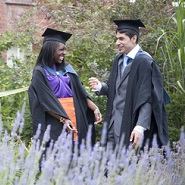Get to know Dr Clare Wright, our Director of Research for English Language:
Clare, our Director of Research, is an expert in multilingual acquisition, and language learning and teaching. She’s always been interested in languages, coming from a part-French background, and time spent during her childhood in Holland and Italy – though as she says, “My Dutch is now limited to a few tongue-twisters and my Brownie promise”. Clare’s first degree was an MA in History at Cambridge, which led to a varied career in politics and marketing until retraining in English language teaching in 1997. She gained her PhD in Linguistics at Newcastle in 2010 looking at the role of working memory in promoting speed of L2 development among Chinese learners of English. She was fascinated to notice similarities between the emerging language of her 3-year old daughter and her Czech au-pair which led her to question the assumption of many language teachers in schools that “language in equals language out”, or that language proficiency is based mainly on explicit memorising. Instead, Clare found that the best progress was made among learners ready to have a go regardless of “getting it right”, based on systematic development of implicit knowledge of language.
Clare joined Reading in 2013 from Newcastle, attracted by the strength of the department in ELT and psycholinguistics, and its leading role in setting up the new Reading Centre for Literacy and Multilingualism. Her main interest is in how language knowledge (grammar, lexis, phonology) intersects with the psycholinguistic processes supporting fluency in speech production – which she says “has involved getting technical with CLAN, PRAAT, DMDX and other specialised software – given I am not a natural technician, this has been quite a steep learning curve, but well worth it!” She is currently leading innovative research into learning Mandarin, while also working on L2 French and English, from primary learners (EAL) to adult learners, including ESOL learners without literacy (ESOL).
Her interest in multilingualism also goes into the role played by language in boosting successful international student experiences, including via online learning or MOOCs. She says” I know from teaching students coming to the UK how there are many barriers to interacting with home students, and getting the right support from teachers”. So Clare also looks at how to improve internationalisation of higher education from both student and teacher perspectives, and particularly to encourage 1-1 interaction between home and international students – as students taking her Autumn class on Core Issues in ELT will know! Clare also runs a follow-on module in the Spring Term called Teaching the Language Skills, which looks in more detail at how language knowledge and processing combine across the different language skills. Dissertations on all such topics welcomed!






